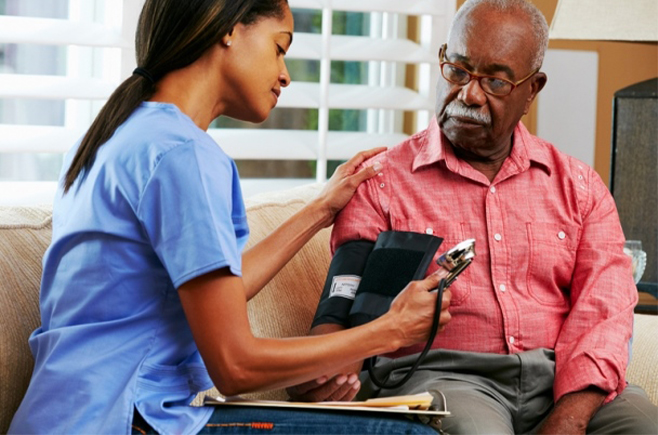
7 Common Types of Home Care Services
The range of home health care services at GoCare is limitless. Home based nursing care is our broadest category apart from physiotherapy, respite care and palliative care. We set up a care plan depending on the patient’s needs. Here’s a brief overview of some home care services our prospective clients should expect:
Blood Pressure Monitoring
High blood pressure increases the risk of developing heart disease and stroke hence the need to reduce/maintain at a healthy rate. Research shows that taking a proactive role through home-based blood pressure monitoring helps speed up recovery and maintains a healthy lifestyle through addressing instances of high/low BP. Our caregivers or nurses are trained to monitor a patient’s blood pressure using digital blood pressure monitoring machines and share the readings with their nurse supervisors/patient’s physician. As such, the patient’s doctor is able to monitor the trends thus accurately adjust/change/prescribe dosages or drugs.
Diabetes Management
Diabetes does not have a cure but it can be effectively managed. Patients who have diabetic wounds, foot ulcers, multiple new medications and those who frequent hospital admissions are more likely to benefit from home-based diabetes management. Our highly trained caregivers or nurses offer specialized care to such patients by helping them follow the set meal plan, promoting physical activity and managing medication.
Wound Dressing and Management
Home health care patients suffer from complex wounds as a result of diabetic ulcers, surgery and circulation disorders. In fact, most of our home-based admissions are related wound dressing and management hence the fastest growing needs in home-care services. We also take care of people with chronic illnesses or disabilities who develop wounds caused by pressure on specific parts of the body. All such conditions affect an individual’s quality of life and our care providers are dedicated to helping you manage them through our proprietary wound management services.
Catheter Care
It is another essential home care service for patients who have urinary infections/problems. Home catheter care minimizes infections and complications that occur during insertion of catheters. Once a catheter is inserted using aseptic technique, care should be taken to maintain a closed drainage system. Care providers at GoCare are adequately equipped to ensure the proper management of catheters by preventing leakage, disconnection and obstruction.
Behavior Management
Conditions like dementia, Alzheimer’s disease, anxiety disorders, bipolar and schizophrenia affect the patient’s mental and behavior state. Our professional patient attendants and or nurses are well-trained to provide support to such patients to improve their quality of life. This home care service is tailored to benefit the whole family by:
- Learning to identify triggers so we can respond to them appropriately
- Helping patients reduce stress
- Promoting positive behavior
- Providing supportive counseling
- Offering home safety
- Managing difficult behavior such as aggression, wandering, sundowing and agitation
Basic Exercises
Home-based exercise programmes help reduce the rate of falls among older adults whose mobility is limited. They help improve function, balance, physical activity and strength. Our caregivers customize the home-based exercises based on the concepts of empowerment and self-efficacy. They also develop coaching sessions in collaboration with the patient’s physiotherapists to ensure the exercises are tailored to the patient’s mobility needs.
Post-surgical Care
We tailor post-operative home health care services to fit the patient’s needs based on his/her personal preferences and the physician’s instructions. Care services provided vary from basic to complex care depending on each patient’s needs. This home care service can be arranged for as little as a few hours to 24 hours a day depending on the complexity of the surgery.
